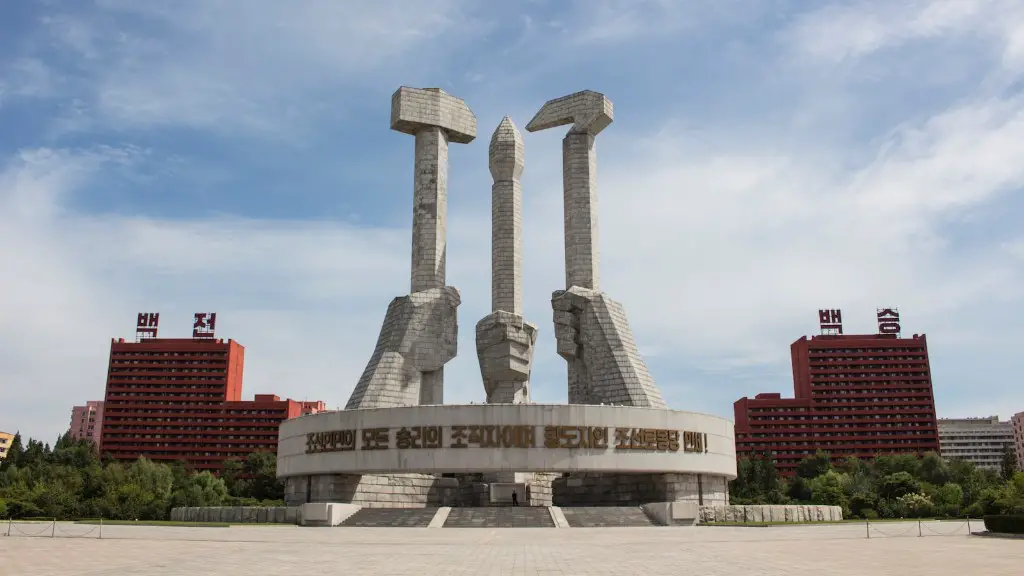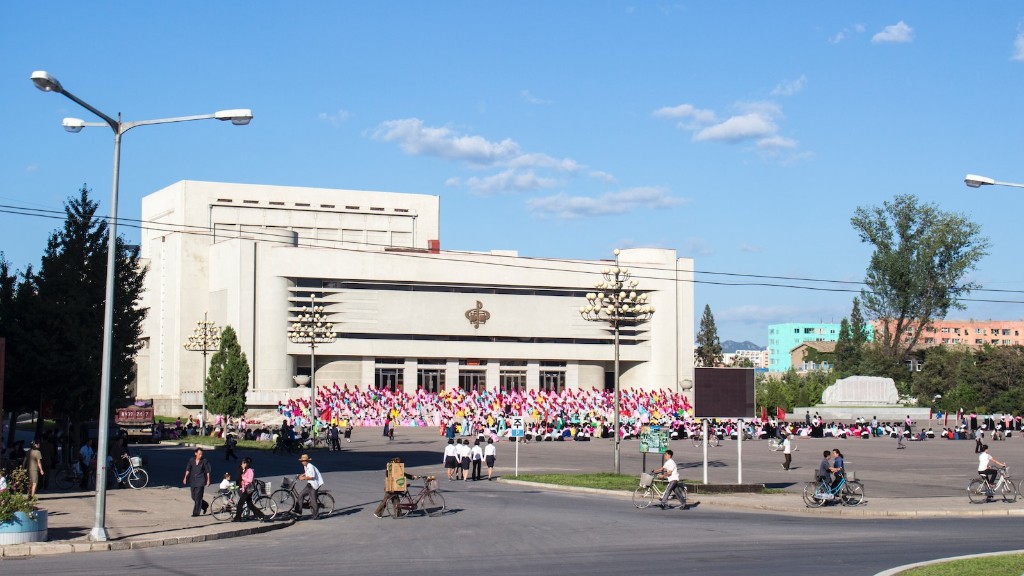Background and Context of North Korea
North Korea is a sovereign state in East Asia and the world’s most isolated and oppressive nation. Pyongyang is the country’s capital and largest city. North Korea is bordered by three countries: South Korea to the east, with which it was divided after the Korean War in 1953; China to the north; and Russia to the northwest. North Korea is a closed, totalitarian state and has been ruled with an iron fist by the Kim family since the nation’s founding in 1948. The nation is heavily militarized, and its citizens are subject to harsh restrictions on their freedom. It is the world’s largest dictatorship, and it has clung to a Juche ideology of self-reliance under which citizens owe absolute loyalty to the state in exchange for loyalty and a portion of available resources.
North Korea has pursued a number of nuclear programs in recent years and has tested a number of ballistic missiles, including intercontinental ballistic missiles capable of reaching mainland United States. As a result, North Korea has been subject to a number of international sanctions, and its actions have been harshly condemned by many nations around the world.
Assessment of North Korea’s Ability to Cause Damage
The damage that North Korea is capable of inflicting on other nations and the world community is highly dependent on the steps taken by the international community to prevent or mitigate such damage.
Given that North Korea is a nuclear power and possesses a large number of long-range ballistic missiles, it is capable of causing significant destruction. It is estimated that North Korea has enough nuclear materials to produce up to sixty nuclear weapons, and its intercontinental ballistic missiles are believed to be capable of reaching targets as far away as the United States.
Furthermore, North Korea may also possess chemical and biological weapons, and its military exercises have been observed to simulate use of these weapons against its enemies. Lastly, North Korea is also believed to have a large arsenal of conventional weapons such as tanks, artillery, and small arms, which it can use to target its enemies in the region.
Thus, North Korea is capable of causing significant destruction, and its actions have been a source of tension and instability in the region and in the world at large.
International Efforts to Curb North Korea’s Capacity to Cause Damage
In response to North Korea’s nuclear ambitions and its other aggressive activities, a number of international organizations have taken steps to try to limit the damage that North Korea can cause.
The United Nations has imposed a series of economic sanctions against North Korea in an attempt to limit the nation’s access to materials and resources that might be used to further its nuclear and ballistic missile programs. Additionally, the United States, South Korea, Japan, and other countries in the region have taken steps to increase their missile defense systems and boost their military capabilities in order to counter any potential North Korean aggression.
Finally, a number of countries have also taken a diplomatic approach to resolving the situation with North Korea. The United States has been engaged in a series of negotiations with North Korea in an attempt to convince it to abandon its ballistic missile and nuclear weapons programs in exchange for economic and other concessions.
Implications for the Region and World
North Korea’s ability to cause destruction is limited by the international efforts described above, and it is unlikely that the nation would be able to launch a successful attack against any of its enemies. Nonetheless, North Korea’s aggressive activities and bellicose rhetoric have caused significant tensions in the region and have had negative implications for the global community.
The threat posed by North Korea’s nuclear weapons and other weapons of mass destruction has served to further destabilize an already unstable region. Additionally, North Korea’s actions have further polarized the international community, leading to increased tensions between countries in the region and beyond.
Moreover, North Korea’s missile tests have caused concern among many of its neighbors, who fear that the nation may use its missiles to attack or threaten its enemies. As such, the presence of North Korea’s weapons has had a chilling effect on the security of the region and the world.
Economic Effects of North Korea’s Actions
Besides the geopolitical implications of North Korea’s aggression, its actions have also had significant economic effects. North Korea’s missiles and nuclear weapons program have resulted in sanctions from the United Nations and other international organizations. As a result, the nation’s economy has suffered, and its citizens have experienced hardship as a result of the international isolation and restrictions imposed on their country.
Additionally, North Korea’s actions have led to increased military spending by other countries in the region, as they seek to bolster their defenses against potential North Korean aggression. This has resulted in a drain on the resources of these countries, which could have been used to finance other important projects such as infrastructure and education.
Finally, North Korea’s actions have also caused global investors to become hesitant to invest in the region, leading to a slowdown in the region’s economic growth. This has in turn had an effect on the entire global economy, and some analysts have argued that it has contributed to the slow economic growth experienced around the world in recent years.
Public Opinion About North Korea
The public in general has a negative view of North Korea and its actions. This is largely due to the oppressive regime in place in the nation, as well as the missile and nuclear tests that have been conducted in recent years.
The public’s opinion of North Korea has been further soured by the reports of human rights abuses and the economic hardship endured by the country’s citizens as a result of international sanctions. Furthermore, the increasing tensions between North Korea and its neighbors have also caused unease among many citizens of these countries, further fueling negative sentiments about North Korea.
Overall, the public’s opinion of North Korea appears to be color greatly by the nation’s aggressive behavior and its oppressive regime. This opinion is unlikely to change until North Korea takes steps to alter its behavior and improve its relations with the international community.
Implications for North Korea’s Future
The damage inflicted by North Korea’s aggressive behavior will likely have long-lasting implications for the nation. Firstly, the international sanctions imposed on North Korea have limited the nation’s access to resources and materials, leading to economic hardship and suffering for the citizens of the country.
Additionally, North Korea’s actions have resulted in a significant erosion of the nation’s international standing, as its neighbors and other countries around the world view it with increasing suspicion and distrust. This has limited the nation’s ability to forge meaningful alliances and discussions with other countries and will make it much more difficult for the nation to achieve its goals.
Finally, North Korea’s belligerence has further destabilized an already unstable region and has resulted in global economic repercussions. This has caused global investors to become wary of investing in the region, leading to a significant economic slowdown in the region and around the world.
Analysis and Conclusions
It is clear that North Korea has the capacity to cause significant destruction if it chooses to do so. The nation is in possession of nuclear weapons and intercontinental ballistic missiles, and there is evidence to suggest that it may also possess chemical and biological weapons. Furthermore, the nation also possesses a large number of conventional weapons that it can use to attack its enemies. As such, North Korea is a threat to its neighbors in the region and to the international community as a whole.
In response to North Korea’s aggressive behavior, many countries have taken steps to limit the nation’s ability to cause damage. These efforts have had some success, and it is unlikely that North Korea would be able to launch a successful attack against any of its enemies any time soon. Nonetheless, North Korea’s actions have caused significant tensions in the region and have had dire economic and social consequences for its citizens, as well as negative implications for the global economy.
Lastly, North Korea’s aggressive behavior has also led to widespread public distrust of the nation, further isolating North Korea from the international community and hampering its ability to improve its fortunes in the near future.





